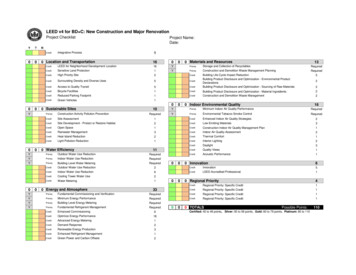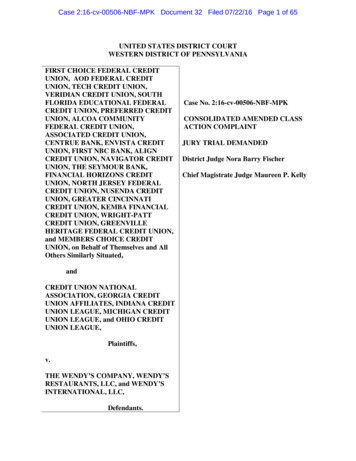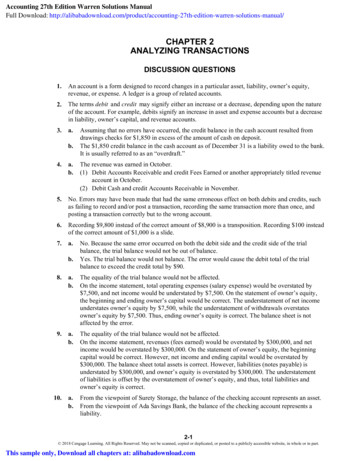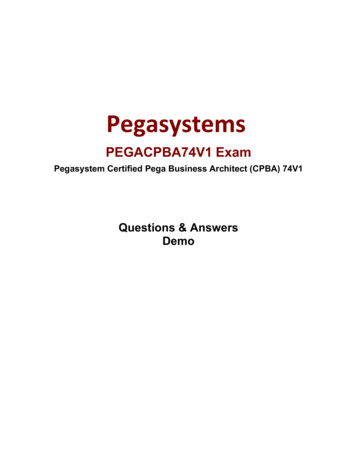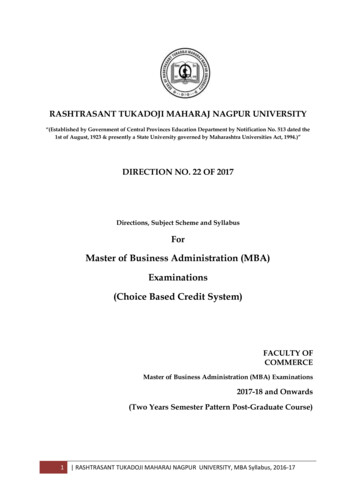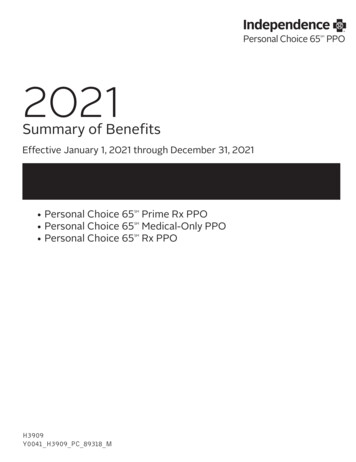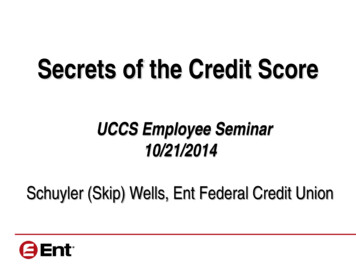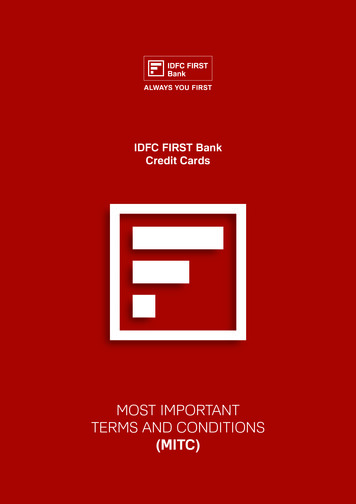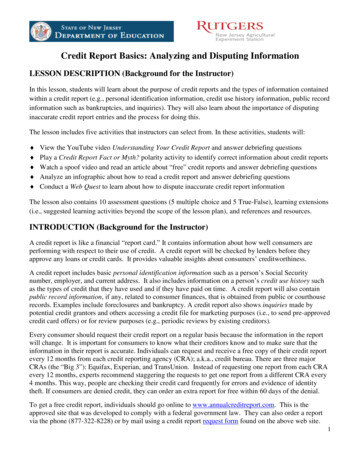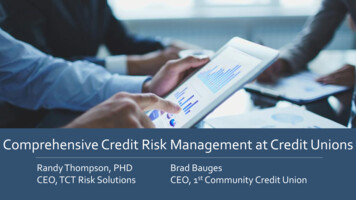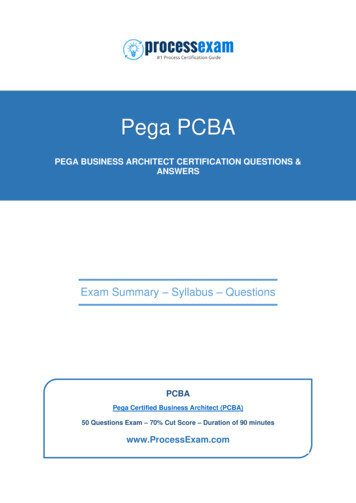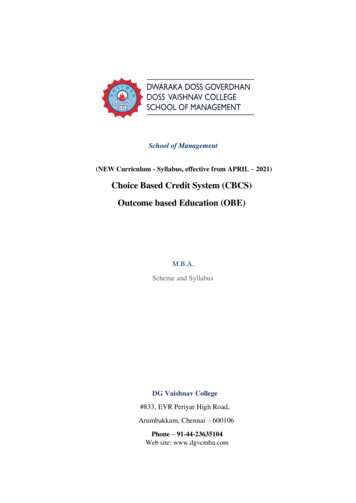
Transcription
School of Management(NEW Curriculum - Syllabus, effective from APRIL – 2021)Choice Based Credit System (CBCS)Outcome based Education (OBE)M.B.A.Scheme and SyllabusDG Vaishnav College#833, EVR Periyar High Road,Arumbakkam, Chennai – 600106Phone – 91-44-23635104Web site: www.dgvcmba.com
TABLE OF CONTENTSS.No1PARTICULARSPage NoVision, Mission and Program Educational Objectives (PEO)32Program Outcomes (PO) with Graduate Attributes33Mapping of POs with PEOs3SCHEME4Scheme of First Semester MBA55Scheme of Second Semester MBA6SYLLABUS67 - 37Syllabus of First Semester MBA:a) MBA-101 Management Process And Organizational Behaviorb) MBA102 Statistics For Managementc) MBA 103 Economics For Managersd) MBA104 Accounting For Managerse) MBA105 Legal Systems In Businessf) MBA 106 International Business Managementg) MBA107 Entrepreneurshiph) MBA-S-101 Soft Skills-I – Advanced Language & Presentation Skills/ PersonalityEnrichment.738Syllabus of Second Semester MBA:a) MBA201 Human Resource Managementb) MBA202 Resource Management Techniquesc) MBA 203 Operations Managementd) MBA204 Financial Managemente) MBA205 Research Methodologyf) MBA206 Management Information Systemsg) MBA207 Marketing Managementh) MBA-S-201 Soft Skills-II- Computing Skills Data Analysis & BusinessModeling/ Technical Writing And Presentation.i) MBA-299 Internship 1Syllabus of Third Semester MBA:a) MBA301 Strategic Managementb) MBA302 Total Quality Managementc) *Elective 1 to 41
d) MBA-S-301 Soft Skills-II Spoken and Presentation skills/ Rural Development Programmee) MBA-399 Internship 2Syllabus of Fourth Semester MBA:a) *Elective 5 to 8b) MBA-S-401 Soft Skills-Managerial Skills/ Career Advancement Course ForManagers.8c) MBA-499 Final ProjectSyllabus of Business Analytics/CIMA9Appendix A Outcome Based Education10Appendix B Graduate Parameters as defined by National Board of Accreditation11Appendix C Bloom’s Taxonomy*List of Electives mentioned in Scheme of Syllabus2
VISIONOur Vision is to emerge as a centre of excellence in Management, imparting value based education todevelop transformational leaders with functional expertise and entrepreneurial perspectives.MISSIONM1Impart Quality Education to the students in core areas and business management with moralValues through our dedicated team.M2 Create learning atmosphere that fosters individual intellectual development.M3 Provide platform for the students to explore their innovative and creative skills.M4 Promoting activities to cultivate the spirit of Entrepreneurship to the studentsEmpowering the students in Organizing Events to gain Experience in Team work andLeadership Qualities.Preparing the students for their role as MBA in society with an awareness of Ethical,M6Environment, Economies, safety and Quality Issues.M5PROGRAM EDUCATION OBJECTIVES (PEOs)PEO1Successful Professionals in Leading National and International Business Enterprise orResearch/ Academic or Entrepreneurs.PEO2 Attitudes and abilities of Leader to adapt the Changing Global Business Scenario.PEO3Good Professional Personality and Ethical Values to lead as responsible citizens andcompetent professionals.PEO TO MISSION STATEMENT MAPPINGMISSION 22CORRELATION3 - STRONG2 - MEDIUM1 - LOW3(-) - NO CORRELATION
PROGRAM OUTCOMES (PO) WITH GRADUATE ATTRIBUTESPO1 Domain KnowledgeApply Knowledge of Management Theories & Practices to solveBusiness ProblemsCritical Thinking &PO2 Decision Making /Problem SolvingFoster Analytical & Critical Thinking abilities for Data – BasedDecision Making.PO3 LeadershipAbility to develop value based Leadership AbilityPO4Environment &SustainabilityAbility to understand, Analyze & communicate Global,Economic, Legal & Ethical aspects of Business.Ability to lead themselves & others in the achievement ofOrganizational Goals, Contributing effectively to ateam environment.PO5 Team WorkP06EntrepreneurshipP07Social Responsiveness& EthicalP08Continuous LearningAbility to identify Entrepreneurial opportunities & leverage,Managerial & Leadership Skills for funding leading start – ups aswell as growing family BusinessApply ethical principles & commit to Professional Ethics &Responsibility and norms of Management Practices.Recognize the need and prepare to engage in lifelong learning in thebroad context of technology changes leading sustainability.Mapping of POs TO PEOsPE0/P0PE01PE02PE03CORRELATION3 - STRONGP01333P02333P032322 - MEDIUMP042321 - LOWP05132P06121P07113P08111(-) - NO CORRELATIONPROGRAM SPECIFIC OUTCOMESPSO 1: Graduates will have ability to Identify, Formulate and analyze the problems relating to Marketing,Finance, Human Resource and Supply chain Management.PSO 2: Graduates will have an ability to implement / Use appropriate Techniques, Management Skills,and Analytical Techniques and to solve Management Problems.4
SCHOOL OF MANAGEMENTSCHEME OF I SEMESTER MBA PROGRAMSl. CourseNO 067MBA- 1078MBA-S101CourseMANAGEMENTPROCESS ANDORGANIZATIONALBEHAVIOURSTATISTICS FORMANAGEMENTECONOMICS FORMANAGERSACCOUNTING FORMANAGERSLEGAL SYSTEMSIN RSHIPSOFT SKILLS-I –ADVANCEDLANGUAGE &PRESENTATIONSKILLSDEPTCreditOverDistributionallL T P C CreditsMarksCIASEETotalMBA 301044060100MBA 301044060100MBA 301044060100MBA 301044060100MBA 301044060100MBA 301044060100MBA 301044060100MBA 002024060100Total303204808005
SCHOOL OF MANAGEMENTSCHEME OF II SEMESTER MBA L T PCOverAllCredits CIAMarksSEETotal1MBA201HUMANRESOURCEMANAGEMENTMBA 3010440601002MBA202RESOURCEMANAGEMENTTECHNIQUESMBA 3010440601003MBA203OPERATIONSMANAGEMENTMBA 3010440601004MBA204FINANCIALMANAGEMENTMBA 3011440601005MBA205MBA 3010440601006MBA206MBA FORMATIONSYSTEMSMARKETINGMANAGEMENTMBA 3010440601008MBA-S201MBA 2000240601009MBA299MBA 000442575100Total34345555900SOFT SKILLS-IIComputing SkillDATAANALYSIS ANDBUSINESSMODELINGINTERNSHIP –1(DEC – JAN 4WEEKS)6
SCHOOL OF MANAGEMENTSCHEME OF III SEMESTER MBA L T PCOverAllCredits CIAMarksSEETotal1MBA301STRATEGICMANAGEMENTMBA 3010440601002MBA302TOTAL QUALITYMANAGEMENTMBA 3010440601003ELECTIVE – 1MBA 3000340601004ELECTIVE – 2MBA 3001340601005ELECTIVE – 3MBA 3000340601006ELECTIVE – 4MBA 300034060100MBA 002024060100MBA 399SOFT SKILLS –SPOKEN ANDPRESENTATIONSKILLINTERNSHIP 2 –(MAY – JUN 4Weeks)7
SCHOOL OF MANAGEMENTSCHEME OF IV SEMESTER MBA L T PCOverAllCredits CIAMarksSEETotal1ELECTIVE – 5MBA 3000340601002ELECTIVE – 6MBA 3001340601003ELECTIVE – 7MBA 3000340601004ELECTIVE – 8MBA 3000340601005MBA-S401SOFT-SKILLS –MANAGERIALSKILLSMBA 0020240601006MBA499FINAL PROJECT –(DEC-JAN- 8WEEKS)MBA 0080850150200MBA 00202MBA MENTCOURSECIMA/BUSINESSANALYTICS (IoA)(Optional)7MBAEEC-3018MBAEEC-302MOOCS A 0 0 2 0PROGRAM(Optional)Total (Optional credits not included)9GRAND TOTAL81
LIST of ELECTIVES for MBA (Full Time)-Semester III and IVCourseCodeCourse TitleDept. L T P CFINANCEFIN-301INVESTMENT MANAGEMENTMBA 3003FIN-302INTERNATIONAL FINANCIAL MANAGEMENTMBA 3003FIN-303MERCHANT BANKING AND FINANCIAL SERVICESMBA 3003FIN-401FINANCIAL DERIVATIVESMBA 3003FIN-402RISK MANAGEMENT AND INSURANCEMBA 3003FIN-403CORPORATE TAXATIONMBA 3003MBA 3003MARKETINGMKT-301SERVICES MARKETINGMKT-302INTEGRATED MARKETING COMMUNICATIONMBA 3003MKT-303GLOBAL MARKETING MANAGEMENTMBA 3003MKT-401SALES AND DISTRIBUTION MANAGEMENTMBA 3003MKT-402RETAIL MANAGEMENTMBA 3003MKT-404SOCIAL MEDIA MARKETINGMBA 3003MBA 3003HR-302STRATEGIC HUMAN RESOURCE MANAGEMENT ANDDEVELOPMENTLABOUR LEGISLATIONSMBA 3003HR-303GLOBAL HUMAN RESOURCE MANAGEMENTMBA 3003HR-305LEADERSHIP AND ORGANISATIONAL EFFECTIVENESSMBA 3003HR-401KNOWLEDGE MANAGEMENTMBA 3003HR-402TRAINING AND HUMAN PERFORMANCE ENHANCEMENTMBA 3003HUMAN RESOURCE MANAGEMENTHR-301SYSTEMS9
SYS-301BIG DATA TECHNOLOGYMBA 3003SYS-302DATA MINING AND WAREHOUSINGMBA 3003SYS-303CLOUD COMPUTINGMBA 3003SYS-401E – COMMERCE TECHNOLOGY AND MANAGEMENTMBA 3003SYS-402EMERGING TECHNOLOGIES FOR MANAGEMENTMBA 3003SYS-403ENTERPRISE RESOURCE PLANNINGMBA 3003SUPPLY CHAIN MANAGEMENT ELECTIVESSCM-301INTEGRATED SUPPLY CHAIN MANAGEMENTMBA 3003SCM-302PURCHASING MANAGEMENTMBA 3003SCM-401INTERNATIONAL LOGISTICS AND MANAGEMENT OFGLOBAL SUPPLY CHAINMBA 3003SCM-402TRANSPORTATION AND WAREHOUSING MANAGEMENTMBA 3003ENTREPRENEURSHIPENT-301MANAGING NEW BUSINESS INITIATIVESMBA 3003ENT-302MANAGEMENT PRACTICES FOR FAMILY BUSINESSESMBA 3003ENT-303PROJECT MANAGEMENTMBA 3003ENT-401MANAGING STARTUPSMBA 3003ENT-402FINANCING NEW VENTURESMBA 3003ENT-403SOCIAL ENTREPRENEURSHIPMBA 300310
FIRST SEMESTER(SYLLABUS)11
MANAGEMENT PROCESSES AND ORGANIZATIONAL BEHAVIOURCourse Code : MBA101L:T:P:C: 3:0:1:4Exam Hours : 03CreditsCIA MarksESE Marks: 04: 40: 60Course Outcomes: At the end of the Course, the Student will be able to:CO1CO2Apply the Principles of Management and effective Decision making and critical thinking andstrategy formulation.Demonstrate the applicability of the concept of OB to analyze the behavior of people in theOrganization.CO3 Analyze Individual Behavior, Job Satisfaction and the importance of Motivation.CO4 Exposure on Group Behavior and the need of Leadership and to handle stressCO5 Evaluate Organization needs, structure and its effectivenessMapping of Course Outcomes to Program Outcomes:PO1 2221112312CO431313212CO522233122CONTENTS OF MODULEManagement Processes - Planning, Nature and purpose of planning - Planningprocess- Types of plans- Objectives- Managing by Objective (MBO) strategies–Decision Making - Types of decision - Decision making process - Organizing- Organization structure - Line and staff authority – Departmentation - Span ofcontrol - Centralization and decentralization - Delegation of authority – Staffing- Selection and Recruitment - Career development - Career stages - Directing –controlling - Types of control - Budgetary and non-budgetary controltechniques -Managing productivity - Quality control - span of control,centralization Vs decentralization, Business Modeling.Introduction to Organization Behavior - Historical perspective - Organization– Management - Role of managers - Evolution of management thought Organization and the environmental factors - Managing globally - Strategiesfor International business.12HrsCos9CO19CO2
3Foundations of individual Behavior - Personality – types – Factorsinfluencing personality – Theories – Learning – Types of learners – Thelearning process– Learning theories– Organizational behaviourmodification.Attitudes – Characteristics – Measurement - Values.Perceptions –Importance –Factors influencing perception. Motivation –Importance –Types –Effects on work behavior - Motivation- concepts andapplications - Theories of Motivation9CO34Foundations of Group Behavior – Formation – Groups in organizations –Influence – Group dynamics – Emergence of informal leaders and workingnorms – Group decision making techniques –Team building – Interpersonalrelations –Communication– Control - conflicts and negotiations,communication - Meaning –Importance –Leadership styles –Theories –Leaders Vs Managers –Sources of power –Power centers –Power and PoliticsStress - Managing change. Stress –Work Stressors – Prevention andManagement of stress – Balancing work and Life9CO45Dynamics of organization - QWL, International OB. Definition, need andimportance of organizational behaviour –Nature and scope – Frame work –Organizational behaviour models. Organizational culture and climate –Factorsaffecting organizational climate – Importance. Job satisfaction –Determinants –Measurements – Influence on behavior. Organizational change –Importance –Stability Vs Change – Proactive Vs Reaction change –the change process –Resistance to change – Organizational development – Characteristics –objectives – Organizational effectiveness Developing Gender sensitiveworkplace.9CO513
TEXT BOOKS:1. Robbins, Essentials of Management, 6e Pearson Education India 20102. Bhattacharya, Principles of Management: Text and Cases, 1ePearson Education India 20123. Robbins, Essentials of Organizational Behavior, 14/ePearson Education India 2019REFERENCE BOOKS:1. Fundamentals of Management-Stephen P Robbins, Mary Coulter et al, PearsonPublications, 11thedition2. Management-Richard L. Daft, Cegage learning,12thEdition,20163. Organization Behavior – Ashwathappa, Himalaya Publication,7th Edition,20074. Robbins, Organizational Behavior, 18/ePearson Education India 2019ASSESSMENT PATTERNCIA- Continuous Internal Assessment (40 Marks)BLOOM’SCLUBCATEGORYCIA MODEL ASSIGNMENT PRESENTATIONACTIVITYMARKS(7)(10)(5)(5)(5)(OUT tandApplyOTHERACTIVITIES(PLS onESE- End Semester Examination (100 Marks, weightage 60%)Bloom’s aluate24Create2614
STATISTICS FOR MANAGEMENTCourse Code : MBA102L:T:P:C: 3:0:1:4Exam Hours : 03CreditsCIA MarksESE Marks: 04: 40: 60Course Outcomes: At the end of the Course, the Student will be able to:Recall and solving problems based on the addition theorem, multiplication theorem,CO1 conditional probability and Bye’s theorem. Restate the Discrete distributions such asBinomial and Poisson distribution.Differentiate the univariate and bivariate analysis. Explain correlation, rank correlation andCO2regression analysis by numerical exampleSummarize the concept of sampling, Null Hypothesis, alternative Hypothesis, type I andCO3 type II errors, sampling errors and standard errors.Distinguish between small samples and large samples. Summarize the concept of parametricCO4 test z-test, t-test, F-test and non parametric test chi-square test by given examples.Demonstrate the analysis of variance of one way classification and two way classificationCO5 with numerical examplesMapping of Course Outcomes to Program Outcomes:PO1 PO2Si.No12345PO3PO4PO5 1CONTENTS OF MODULEProbability: Introduction to probability theory: events and their probabilities,subjective probabilities; continuous and discrete distributions: Binomial,Poisson, Normal, and exponential distributions; Expected values, averages andstandard deviations. Conditional Probability – Bayes’ theorem.Correlation, Regression Analysis: Correlation coefficient – Rank Correlationcoefficient – Regression lines.Sampling distribution : Estimation and Hypothesis, Sampling Distributionconcepts, Introduction to sampling distributions, concepts – sample size ––Hypothesis – Testing of Proportion and Mean - Methods of sampling –Concepts of sampling and non- sampling errors – Standard error- Type I andType II error in Hypothesis testingParametric Analysis –. Chi Square Test – Goodness of Fit – Relationshipbetween variables - t testAnalysis of variance – one-way and two-way classification15HrsCos9CO19CO29CO39CO49CO5
TEXT BOOKS:1. Mariappan, Operations Research, 1e by Pearson Education India 2013.2. Natarajan, Operations Research, 2e by Pearson Education India 2014.3. Taha, Operations Research: An Introduction, 10e Pearson Education India 2018REFERENCE BOOKS:1. Green & Tull, Market Research, Prentice Hall2. Amir D. Aczel, Complete Business Statistics, 5th ed., Irwin McGraw Hill,20013. Hooda R.P, Statistics for Business and Economics, 2nd ed., McMillan India4. Richard I .Levin & David S .Rubin, Statistics For Management ,7th ed., PHI5. Dr. P.N. Arora and Mrs. S. Arora, Statistics for management, S. Chand & Company Ltd.ASSESSMENT PATTERNCIA- Continuous Internal Assessment (40 Marks)BLOOM’SCATEGORY MARKS(OUT ATION(5)CLUBACTIVITY5)OTHER ACTIVITIES(PLS SPECIFY)(4)2Understand22223233Applicatio nofcorrelationon businessmodelApplyApplication ofResearchtoolsAnalyzeEvaluate(4)25CreateESE- End Semester Examination (100 Marks, weightage 60%)Bloom’s aluate24Create2618
ECONOMICS FOR MANAGERSCourse Code : MBA103L:T:P:C: 3:0:1:4Exam Hours : 03CreditsCIA MarksESE Marks: 04: 40: 60Course Outcomes: At the end of the Course, the Student will be able to:CO1 Analyse Market demand and supply patterns through forecasting techniques.CO2 Evaluate National Income using techniques and underlying policies.CO3 Compare market structures and different pricing methods.CO4 Analyse and evaluate demand pattern using Date software.CO5 Identify the consequence of globalization and role of Banks in International Trade.Mapping of Course Outcomes to Program Outcomes:PO1 PO2Si. 2322CO433131323CO533121222CONTENTS OF MODULEIntroduction to Managerial Economics – Decision making in the household:Consumer choice, Theory of Demand; Its Determination, Estimation andForecasting – Decision making in the firm: production, cost, supply; itsDetermination and Derivation.HrsCos9CO1
2345Macroeconomics : National Income – GDP – GNP – NNP –Price Indices –Inflation – Output – Consumption – Savings – Investment– Economiccollapse - Economy Resilience - International Trade , IS-LM Model ,Impact of government policies –Monetary policy – Fiscal policy – IndianTrade policy –Exchange rate policyEquilibrium in different market structures – Perfect Competition, Monopoly,Discriminating Monopoly, Monopolistic Competition, Oligopoly; Pricing –Types and MethodsEconometrics – Different Data types – Regression Models ; Demand analysisand Forecasting – Techniques of Demand Forecasting ; Use of Softwarepackages for Forecasting ; Use of Big Data Analytics in Economics.9CO29CO39Role of Central Banks – Role of Commercial Banks – Impact of Interest Ratesin all areas – Foreign Exchange Market : Determination of Exchange rate ,Impact of Foreign Exchange Rate , Forward Contracts , Futures and Options tomanage the impact of Exchange Rate changes ; Concept of Globalization –Institutions encouraging IN Trade – Balance of Trade – Balance of Payments.New Economic Model.9CO4,CO5CO5TEXT BOOKS:1. Agarwal, Managerial Economics, 1/ePearson Education India 20132. Sloman, Essential Economics for Business, 5ePearson Education India 20193. Keat, Managerial Economics, 7ePearson Education India 2013REFERENCE BOOKS:1. Mithani, D M, Managerial Economics – Theory & Applications, Himalaya Pub.2. Mehta, P L, Managerial Economics – Analysis, Problems & Cases, Sultan Chand3. Peterson, H. C and Lewis, W. C. Managerial Economics, 4 th Ed, Prentice Hall4. Abel & Bernanke, Macroeconomics, 4thed, Pearson Pub5. Froyen, Macroeconomics, 6th ed., Pearson EducationASSESSMENT PATTERNCIA- Continuous Internal Assessment (40 Marks)BLOOM’SCATEGORYCIA MODEL ASSIGNMENMARKS(7)(10)T (5)(OUT IVITY(5)(5)222220OTHERACTIVITIES(PLS SPECIFY)(4)(4)
AnalyzeEvaluate3233MicroAndMacroAnalysis25Study onEconomicPoliciesCreateESE- End Semester Examination (60 ly14Analyze22Evaluate24Create2621
ACCOUNTING FOR MANAGERSCourse Code : MBA104L:T:P:C: 3:0:1:4Exam Hours : 03CreditsCIA MarksESE Marks: 04: 40: 60Course Outcomes: At the end of the Course, the Student will be able to:CO1CO2CO3CO4CO5Apply the conceptual framework of accounting, and apply the comprehensive treatmentof accounting principles and standards.Analyze the financial concepts and interpret the Financial statementsAnalyze and Evaluate financial data of Company.Apply the cost principles for production of products.Apply Analytical techniques to generate financial statements through technologyapplication.Mapping of Course Outcomes to Program Outcomes:PO1 11222222322CO432121211CO533121322CONTENTS OF MODULEUnit I: Financial AccountingDefinition - Principle Concepts & Conventions – Accounting Standards- Preparation Of Final Accounts: Trial Balance- Trading, Profit/LossAccount and Balance SheetUnderstanding Of Final Accounts with Adjustments: Provision forDoubtful Debts, Discount on Debtors and Creditors, Bad Debts, Intereston Capital, Prepaid Expenses and Outstanding.Unit II:Company AccountsMeaning Of Company – Maintenance Of Books Of Accounts – Profit OrLoss Before Incorporation – Alteration Of Share Capital – PreferentialAllotment, Employee Stock Option – Buy Back Of Securities Introduction of Insolvency and Bankruptcy Code 2016 - Objectives.22HrsCos9CO19CO2
3Unit III: Analysis Of Financial StatementFinancial Statement Analysis-Common size Statement and9CO39CO4,CO39CO5Comparative Statement, Ratio Analysis - Comparison between FundsFlow and Cash Flow Statement – Cash Flow Analysis (as per INDAS7 Standard)45Unit IV: Cost AccountingCost Accounts – Classification And Accounting Of Manufacturing Costs– Cost Accounting System - Budgets And Budgetary Control – MarginalCost Analysis, Cost Accounting – Elements Of CostUnit V: Accounting In Computerised EnvironmentSignificance Of Computerized Accounting System – Codification AndGrouping Of Accounts – Maintaining The Hierarchy Of Ledgers –Prepackaged Accounting Software.TEXT BOOKS:1. Dhamija, Financial Accounting for Managers, 3e Pearson Education India 2019\2. Gupta,Financial Accounting for Management, 6ePearson Education India 20193. Horngren, Horngren’s Cost Accounting, 16ePearson Education India 2017REFERENCE BOOKS:1. Carl S Warren, James M Reeves, Philip E Fess, “Financial Accounting” , Thompson, 20032.T.S. Reddy & Y. Hari Prasad Reddy – Financial and Management Accounting –MarghamPublications,3. NhaveshM.SPaul, Cost Accounting or Management Accounting, Allied Publishers Ltd.,NewDelhi, 19974. S.P. Jain & K.L. Narang, Cost Accounting, Kalyani Publishers, Ludhiana, 19975.N.Ramachandran&Ramkumar – “Financial accounting for management – Tata McGraw hill23
ASSESSMENT PATTERNCIA- Continuous Internal Assessment (40 Marks)BLOOM’SCATEGORYCLUBCIA MODEL ASSIGNMENT PRESENTATIONACTIVITYMARKS(7)(10)(5)(5)(5)(OUT lyzeEvaluateOTHERACTIVITIES(PLS ntof newbusinessModelESE- End Semester Examination (60 Marks)Bloom’s aluate24Create2624
LEGAL SYSTEMS IN BUSINESSCourse Code : MBA105L:P:T:C: 3:0:1:4Exam Hours : 03CreditsCIA MarksESE Marks: 04: 40: 60Course Outcomes: At the end of the Course, the Student will be able to:CO1 Examine the relevance of business law to individuals and businesses and the role of lawin an economic, political and social contextCO2 Identify the legal principles governing contractual agreements.CO3 Apply the principles of company law in Incorporation process.CO4 Implement appropriate laws in IR.CO5 Analyze and evaluate Consumer Protection Laws.Mapping of Course Outcomes to Program NTS OF MODULECommercial Law - The Indian Contract Act 1872Definition of contract, essentials elements and types of a contract,Formation of a contract, performance of contracts, breach of contract and itsremedies, Quasi contracts - Contract Of Agency: Nature of agency,Creation and types of agents, Authority and liability of Agent and principal:Rights and duties of principal and agents, termination of agency.Cos9CO19CO29CO3,CO5Commercial Law - The Sale of Goods Act 1930Special contracts – sale of goods act 1930 – negotiable instruments act1881, Types of negotiable instruments3HrsCompany LawKinds of companies – formation & incorporation of a company –memorandum & articles of association – prospectus – Power, duties andliabilities of Directors– meetings– winding up of a company25
Industrial LawIntroduction to Industrial Disputes Act 1947, An Overview of FactoriesAct, 1948 – Employee Provident Fund & Miscellaneous Act, 1952 –Employee State Insurance Act, 1948, Payment of Wages Act, 1936.4Consumer Protection Act and Cyber LawsThe consumer protection act- Consumer rights, Procedure for consumergrievance redressal, Types of consumer redressal machineries and ForumsCyber Laws, Introduction to IT Act 2000, Introduction of IPRS-Patents,Copyright, Trademarks.Online Course on Taxation - GST (with Completion Certificatemandatory- Internal Assessment )59CO4,CO59CO5TEXT BOOKS:1. N.D. Kapoor, “Elements of Mercantile Law”, Sultan Chand & Company, India, 2006.2. P. K. Goel, Business Law for Managers, Biztantatara Publishers, India, 2008.3. Sheth, Business Law, 3e16ePearson Education India 2017REFERENCE BOOKS:1. P.P.S. Gonga, “ Mercantile Law”, S.Chand & Co, New Delhi.2. Dr. Vinod K. Singhania, “Direct Taxes Planning Management”.3. G.K.Kapoor – “ Lectures on corporate and allied laws” – Sultan chand & sons4. Richard Stim, Intellectual Property- Copyrights, Trademarks and Patents, Cenage learning.5. Akhileshwar Pathack, Legal Aspects of Business, 4th Edition, Tata McGraw Hill, 2009ASSESSMENT PATTERNCIA- Continuous Internal Assessment (40 Marks)BLOOM’SCATEGORYCLUBCIA MODEL ASSIGNMENT PRESENTATIONACTIVITYMARKS(7)(10)(5)(5)(5)(OUT RACTIVITIES(PLS seStudies
CreateESE- End Semester Examination (60 Marks)Bloom’s aluate24Create2627
ENTREPRENEURSHIPCourse Code : MBA- 107L:P:T:S: 3:1:0:0Exam Hours : 03CreditsCIA MarksESE Marks: 04: 40: 60Course Outcomes: At the end of the Course, the Student will be able to:CO1 Imbibe entrepreneurial concept and models, and Develop skillCO2 Differentiate entrepreneurs and Entrepreneurs skillEstablish records for small business, relating to legal aspects and other functionalCO3 management practicesCO4 Mobilize resources for ED in an Optimum wayIdentify and Utilize the support eco-system for managing the business and start a NewCO5 Business Model.Mapping of Course Outcomes to Program Outcomes:PO1 22333112222CO432222322CO532323321CONTENTS OF itionofentrepreneurship, Characteristics of entrepreneurship, A conceptionmodel, Types of Businesses –Family Business VS Startup- Definition ofSSI, MSI, MSE, Ancillary,7Understanding Entrepreneurship, Growth of a Business Idea ,Intellectual Property, Family Business, Doing Business in India ,Entrepreneurial Support Entrepreneurs and emergence of IndianEntrepreneurs – Traits of successful entrepreneurs – Entrepreneurs VsManagers - Entrepreneurial Development Program – EntrepreneurialDevelopment Institute ( EDI )928CosCO1CO2
345Maintenance of Records - Ledgers, Documentation, formalities - Legalaspects in establishing and maintenance of Small Business StrategicManagement in Small Business - Financial Management in SmallBusiness – Working capital management - Marketing Management inSmall Business – Selling to Government, Industries, Institutions andConsumer market - Production Management in Small Business - HumanResource Management in Small Business.8CO3,CO4Mobilizing Resources - Buying a Business , Entrepreneurial Finance ,Making a Business Plan Operations and Management - ManagingOperations , Human Resource Management, Entrepreneurial Marketing,New Product Development , E-Business , Networking ,ProjectManagement8CO1CO5Growth and Social Responsibility - Growth , Exit Strategies , SocialResponsibility, Ethics in Business Institutions Supporting SmallBusiness Enterprises – SIDBI, IDBI, SIPCOT, TIIC, TCO, SIDCO,NSIC, TDA ,Export Promotion council, etc. Intellectual PropertyEntrepreneurial Support , Women Entrepreneurs ,Sickness in SmallBusiness Enterprise8CO4CO6TEXT BOOKS :1. Charantimath, Entrepreneurship Development and Small Business Enterprises, 3/e PearsonEducation India 20182. Kumar, Entrepreneurship: Creating and Leading an Entrepreneurial Organization , 1e PearsonEducation India 20123. Holt, Entrepreneurship : New Venture CreationPearson Education India 2016.REFERENCES:1. Hisrich R D, Peters M P, “Entrepreneurship” 8th Edition, Tata McGraw-Hill, 2013.2. Mathew J Manimala, “Enterprenuership theory at cross roads: paradigms and praxis” 2nd EditionDream tech, 2005.3 .Rajeev Roy, ‘Entrepreneurship’ 2nd Edition, Oxford University Press, 2011.4. EDII “Faulty and External Experts – A Hand Book for New Entrepreneurs Publishers:Entrepreneurship Development”, Institute of India, Ahmadabad, 1986.ASSESSMENT PATTERNCIA- Continuous Internal Assessment (40 Marks)BLOOM’SCATEGORY MARKS(OUT (5)PRESENTATION(5)229CLUBACTIVITY(5)OTHER ACTIVITIES(PLS SPECIFY)(4)(4)
Apply22223233Reengineering businessmodelAnalyzeEvaluate25Business Planfor StartupCreateESE- End Semester Examination (60 Marks)Bloom’s aluate24Create2630
INTERNATIONAL BUSINESS MANAGEMENTCourse Code : MBA207L:P:T:C: 3:0:1:4Exam Hours : 03CreditsCIA MarksESE Marks: 04: 40: 60Course Outcomes: At the end of the Course, the Student will be able to:CO1 Recognize challenges and opportunities for Foreign Trade marketsCO2 Critically analyze the procedures in Exports and ImportsCO3 Explore strategies and analyze the impact of Global strategies in International BusinessApply the concept of globalisation techniques to support problems in MNCCO4managementEvaluate the impact of statutory and regulatory compliances on an organizationsCO5integrative trade initiatives.Mapping of Course Outcomes to Program 3-2232111CO42-12-2-1CO52--3---131
SlCONTENTS OF MODULEHrsCos9CO19CO29CO3NoIntroduction to International Business – Conceptual Foundation of InternationalBusiness – Definition – Growth – Dimensions – Reas
7 Syllabus of Second Semester MBA: 38 a) MBA201 Human Resource Management b) MBA202 Resource Management Techniques . MBA207 Marketing Management h) MBA-S-201 Soft Skills-II- Computing Skills Data Analysis & Business Modeling/ Technical Writing And Presentation. i) MBA-299 Internship 1 Syllabus of Third Semester MBA: a) MBA301 Strategic Management
